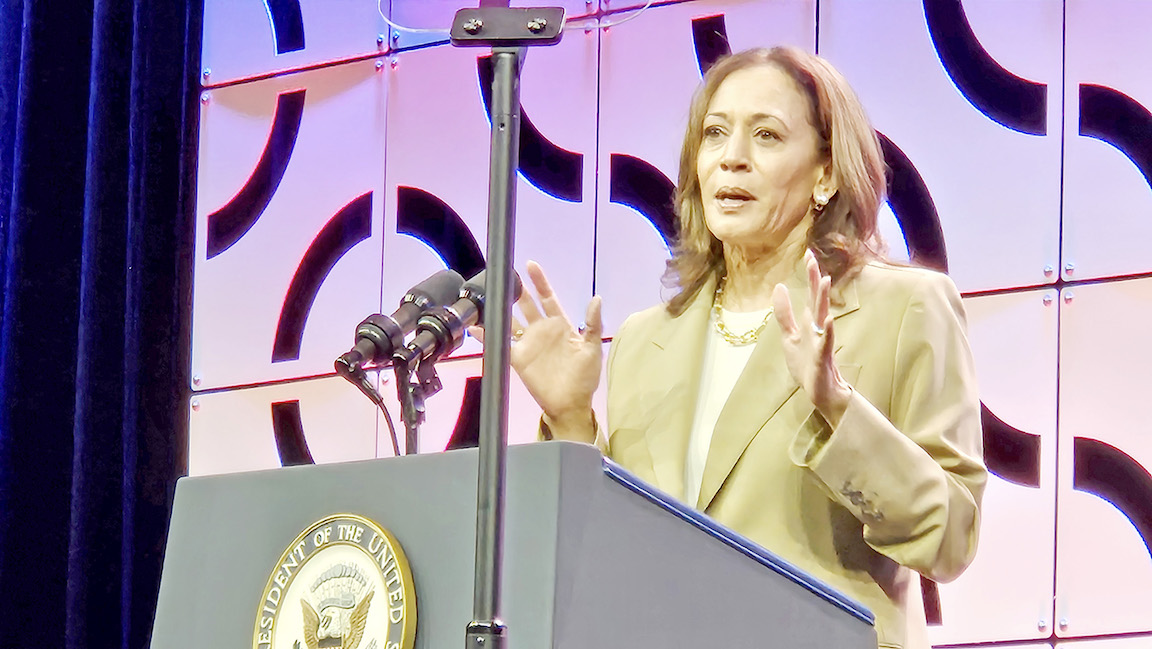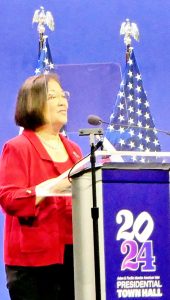
VP Kamala Harris at the July 13 event. (Photo: Gil Asakawa)
Veep’s speech coincides with the JACL National Convention in Philadelphia.
By George Toshio Johnston, Senior Editor
Let’s face it: On July 13, calling it a Presidential Town Hall was borderline false advertising. Neither of the presumptive Republican or Democratic nominees for the U.S. presidency were on the bill for the live and in-person event at the Pennsylvania Convention Center.
The combined potential voting blocs of the event’s sponsor, APIA Vote, as well as OCA and JACL, all of which were present at the same time in the same city, did not garner enough interest for either former President Donald Trump or incumbent President Joe Biden to show up. (The latter, by comparison, was there in person on July 16 for the NAACP Convention in Las Vegas.)
Post-July 21, however, having Vice President Kamala Harris headline the Presidential Town Hall now looks smart and prescient.
Under any circumstance, seeing and hearing the vice president of the United States in person is a rare, historic and memorable event. For the 1,200 who came to see and hear VP Harris that Saturday — not to mention the thousands more who livestreamed the event or watched the broadcast on Fox and PBS — as the keynote speaker, there was an added layer significance: It was, in retrospect, one of the last public appearances Harris would make as Biden’s running mate for his re-election bid as the presumptive presidential candidate for the Democratic Party.
Meantime, on the same day that Harris took the stage in Philadelphia, elsewhere in the same state, the former president and presumptive Republican presidential candidate survived an assassination attempt in the town of Butler, more than 300 miles from Philadelphia.
That attack resulted in the deaths of the gunman, who was killed by a Secret Service sharpshooter, and a man in the crowd who was felled by a round fired from the assassin’s rifle, as well as critical injuries to two audience members in attendance at the rally.
By July 15, former President Trump — whose right ear was said by authorities to have been grazed by one of the gunman’s bullets — was in Milwaukee, Wis., to attend the Republican National Convention and announce his running mate, Ohio Sen. J.D. Vance, with both that announcement and the assassination attempt adding momentum to Trump’s bid to retake the White House.
Then, just eight days after Harris’ Philadelphia appearance, the 81-year-old Biden delivered a historic, head-spinning and potentially game-changing announcement: He would not seek a second term. Furthermore, he endorsed the younger and more vibrant and vigorous Harris to lead the ticket as the Democrat’s presumptive candidate for the U.S. presidency come Nov. 5. In the chess match for the White House, it was a momentum-shifting move that thus far has been a boon to Harris.
Looking back, was there anything of significance on display that day or that Harris said in Philadelphia that might augur what is to come now that America now has its first-ever woman of South Asian and African American heritage running for the most-powerful political position in the world?
The answer is yes, both positive and negative.
First, some pluses. Regarding the growth potential for Asian Americans in politics, on display July 13 on the same bill as Harris were several Asian American politicians, national and local (Philadelphia City Councilmember Nina Ahmad), as well as many local-level AANHPI community leaders.

Sen. Mazie Hirono (D-Hawaii) was one of many AANHPI politicians and community members who spoke at the event. (Photo: Gil Asakawa)
Reps. Judy Chu, Jill Tokuda and Ted Lieu, as well as Sen. Mazie Hirono, stand to gain political power and prestige should Harris become POTUS. They were there for her in Philadelphia and presumably, should she win, Harris will be there for them when it comes to getting her support for their respective re-election bids — or for cabinet-level, ambassadorial and other high-level appointments.
Another plus: If true to her word, Harris should be an ally on the issue of saving Asian American ethnic enclaves and historic sites from being paved over by developers unsympathetic to both the historic significance of those sites and the displacement of any low-income residents therein.
Said Harris: “President Biden and I have also addressed many long-standing inequities, including inequities like the lasting effect of so-called urban renewal projects, including right here in Philadelphia, the Vine Street Expressway decades ago. That expressway was built to cut right through Chinatown.”
Today, the issue in Philadelphia is a new sports arena that threatens its Chinatown. There is also the issue of saving what is left of Salt Lake City’s historic Japantown from yet another sports arena. Furthermore, there is the preservation of historic integrity of Japanese American incarceration sites that are also facing changes from encroaching development.
Then there is the issue of the rise in anti-Asian hate crimes and related incidents, not to mention the rise in modern-day alien land laws. As a woman who is South Asian from her mother’s lineage, Harris has an inherent stake in fighting the problem and the potential to use the powers of the presidency, if elected, to take strong stands against perpetrators and her past professional background to ensure that said perpetrators are prosecuted to the full extent of the law.
As for negatives, they exist. In particular, for some Japanese Americans in California, Harris was a disappointment when she was the attorney general for not doing more to ameliorate the issues raised by the sale of the former Keiro senior care facilities to San Diego-based Pacifica Cos.
Also, the Israel-Hamas issue isn’t going away. During her speech, she was interrupted on several occasions by pro-Palestinian supporters who had to be escorted by security from the premises. (The chants of dissent led to counterchants of “four more years,” which brought a smile to Harris.)
In conclusion, having Harris speak at the Presidential Town Hall turned out to be fortuitously appropriate. But no candidate is perfect, and voters know it. You have to accept candidates’ pluses and minuses when voting.
Still, for women in general and for women of color in particular who’d like to see one of their own in the White House, she checks that box. For African Americans and Asian Americans, she checks that box. For Americans who don’t want a convicted felon in the White House and want a more progressive agenda regarding antitrust concerns, climate change, clean and renewable energy, reshoring American manufacturing, reinvesting in infrastructure and ensuring that the U.S. stands with European and Asian allies against annexation and conquest while standing for rule of international laws and treaties against tyrants and authoritarian strongmen, she (presumably) checks those boxes.
For now, put on your helmets and fasten your seat belts. It’s likely to be a bumpy ride between now and the first Tuesday of November.
(Note: The Presidential Town Hall can be viewed on YouTube at tinyurl.com/4m4uz4xd.)



